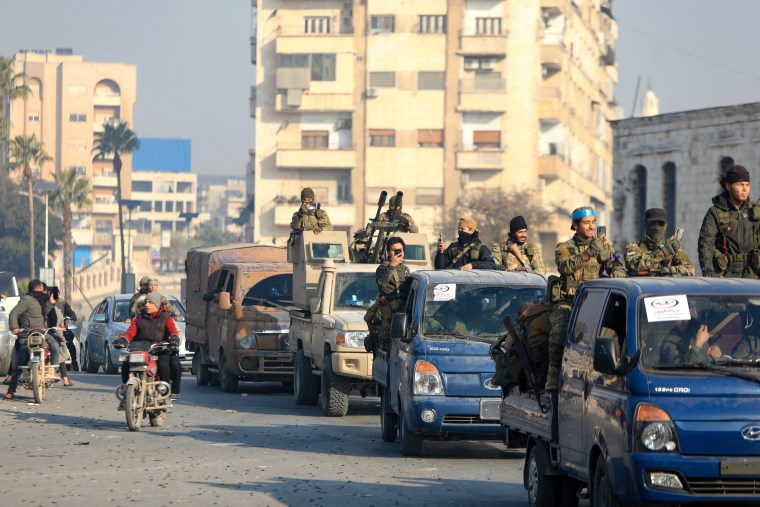
As they continued their lightning-fast attack on Saturday, Syrian rebels claimed to have taken control of a major city in the southwest near the Jordanian border, threatening to further destabilize an already war-torn region.
As the site of pro-democracy demonstrations in 2011 that ignited the nation’s continuing civil conflict and a crucial border crossing, Daraa’s conquest would represent a strategic and symbolic win for the rebels.
In a WhatsApp message on Friday, the Hayat Tahrir al-Sham (HTS) declared that the city of Daraa was fully freed from the criminal regime’s and its militias’ control.
NBC The Syrian Observatory for Human Rights (SOHR), a U.K.-based war monitor, stated on Friday that rebels in the south held over 90% of the Deraa region, including Daraa city, although it was unable to independently confirm the rebels’ claims.
Syria’s army, on the other hand, said that its troops in Daraa had repositioned and built a solid, unified defensive and security perimeter in that direction.
Daraa would be the most recent in a series of cities to fall under the rebels’ sweeping onslaught, which has drastically changed the balance of power in Syria.
HTS-led terrorists have taken control of Aleppo in the north and the central city of Hama in less than two weeks. On Thursday, government soldiers were ejected from the city.
The rebels’ takeover of Daraa also follows HTS’s assertion on Friday that it had moved to the outskirts of Homs, a crucial intersection that links Damascus with government positions on the Mediterranean coast.
Russia has a military presence, including the naval base at Tartus, while Iran has traditionally backed Syrian President Bashad Al-Assad. However, larger regional crises, such as Russia’s protracted war with Ukraine and Israel’s war in Gaza and conflicts with Hezbollah in Lebanon, have diminished both countries’ influence.
It’s “pretty much the end game for Assad” if the rebels capture Homs, H.A. Hellyer, a senior associate fellow at the London-based think tank Royal United Services Institute, told NBC News over the phone on Saturday.
“Once they get Homs, then really Damascus is cut off and they’ll all be centered around Damascus and Latakia on the coast.”
Three of the nation’s five main cities would be under the control of HTS-led forces if the strategically significant municipality of Homs fell, leaving no significant cities between rebel forces and Damascus.
However, despite the rebels’ quick advance, Hellyer noted there was still no clear end to the fight.
“It comes down to how much fighting spirit there is left in this rump of the Syrian army,” he said. “How much they feel they can hold out in terms of support from the the Russians and the Iranians, which hasn’t been forthcoming.”
The Syrian army announced on Saturday morning that it has started to seize control of the Hama and Homs provinces against what it described as “terrorist organizations.”
NBC News was unable to independently confirm its assertions.
The threat to Homs and the breakdown of government control in Daraa point to a strengthening weakness in Syrian President Bashar Al-Assad’s grip on power.
The collapse of Aleppo and Hama, along with other towns like Idlib and many rural communities, has reportedly put Assad’s forces under a great deal of strain as conflict between government troops and different rebel factions rages throughout the nation, according to a number of sources from throughout the nation.
Kurdish forces also took control of government posts in eastern Syria, close to the towns of Raqqa and Deir Ez-Zour, and pro-Assad troops were fighting them, according to the Observatory.
Due to the security situation in southern Syria, Jordan’s interior ministry said that it was suspending its Jaber border crossing to all outbound traffic, according to official media.
For the first time since Israel seized the Golan Heights from Syria during the 1967 Mideast War and annexed it in 1981, the observatory said on Saturday that Syrian government forces have left the Israeli-controlled territory.
According to the observatory, since the rebels launched their onslaught, more than 820 people have been murdered nationwide, including 111 civilians.
Note: Every piece of content is rigorously reviewed by our team of experienced writers and editors to ensure its accuracy. Our writers use credible sources and adhere to strict fact-checking protocols to verify all claims and data before publication. If an error is identified, we promptly correct it and strive for transparency in all updates, feel free to reach out to us via email. We appreciate your trust and support!
